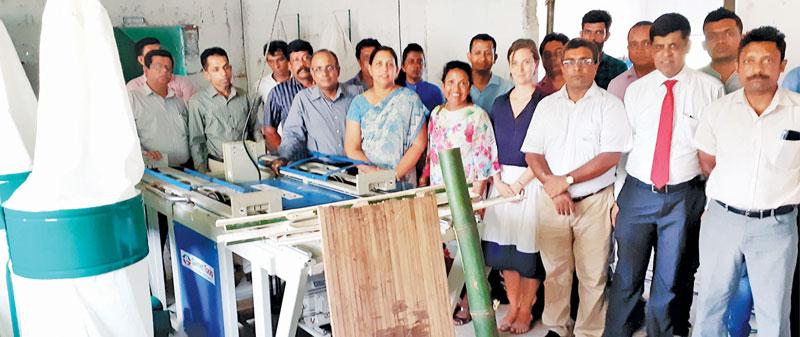
The United Nations Industrial Development Organisation (UNIDO) with the public sector, has granted hi-tech machinery for the production of bamboo boards in Sri Lanka. The machinery used for the production of board greatly enhances creation of glue laminated timber boards based on local bamboo supplies.
The latest breakthrough is a part of ‘Bamboo Processing Sri Lanka’ - a project launched by UNIDO, funded by Global Environment Facility (GEF) and is implemented in collaboration with the Ministry of Industries and Supply Management.
The objective of this project is to develop a bamboo supply chain and product industry. Bamboo is an exceptionally fast growing and resilient plant. Producing laminated boards from bamboo will reduce logging pressure on forests and therefore, protect the environment.
Until now, glue laminated bamboo boards had to be imported to Sri Lanka from neighbouring countries. This machinery greatly enhances the creation of glue laminated timber boards from bamboo within Sri Lanka for the first time, which can then be further processed with standard wood processing machinery into the full range of timber products, without depending on local timber supplies. By transferring advanced technology to the private sector in this way, UNIDO is improving the competitiveness of small and medium enterprises and greening supply chains.
UNIDO, in collaboration with the public sector, granted the line of equipment for the production of bamboo laminated boards to CEO of the Dathri/Dowell Creations Display Systems, Tyrone Fernando last week.
The machinery will be used in his bamboo processing facility in Negombo.
The launch event took place in Kadirana, Negombo. Representatives of various UN Organisations and the public sector were also present.
The two-day training of trainers by the IDB started on the same day. This hands-on workshop provides opportunities to IDB trainers to gain the needed knowledge and experience on how to use and maintain the equipment properly, which they will disseminate at their facilities from next year. Transferring this equipment is a step towards developing a national bamboo supply chain and product industry, and will make investments towards commercial bamboo plantations on degraded land economically attractive.
A second bamboo production machinery line will be imported and set up at the Industrial Development Board of Ceylon (IDB) in Moratuwa early next year, to support local capacities for technology promotion and transfer of soft skills.
The IDB is to set up a national bamboo training centre and will promote the use of bamboo as a substitute for wood while tackling deforestation and creating innovative and sustainable products. - UNIDO
